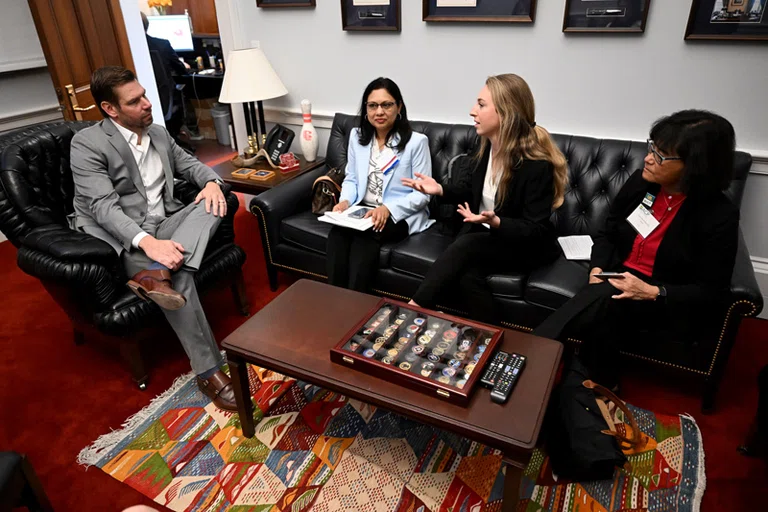


Advocating With You and For You: Advocacy in Action
Leadership Day, May 23-24, 2023, Washington, D.C.
ACP Advocacy Efforts
It is our mission to improve the health care system so that it works for you and your patients. Through evidence-based policy papers, grass roots efforts, work with congressional leaders, key agencies, regulators, and collaborations with organizations with similar goals, ACP works to make legislation and regulations better, helps to reduce burnout, increase job satisfaction, and improve patient care. Our advocacy strives to eliminate unnecessary and costly administrative burdens that divert physicians away from patient care, improving care, and helping to improve the health care systems for our members and their patients.
ACP also advocates for public health issues as part of our commitment to improving the health of our patients. Those issues include things like preventing firearms-related injuries and deaths, protecting against threats to the patient-physician relationship, and improving access to care for patients, particularly for marginalized populations.
ACP’s Advocacy Priorities for 2023
- Reducing administrative burden in health care
- Ensuring appropriate physician compensation
- Addressing prescription drug costs
- Improving access to mental and behavioral health care
- Ensuring access to care after the COVID-19 public health emergency
- Ensuring adequate funding for public health and pandemic preparedness
- Supporting patient access to reproductive health services
- Advancing equity in health care
- Preventing of firearm-related deaths and injuries
- Mitigating the effects of climate change
ACP Advocacy Wins
Helping Internal Medicine Physicians in Your Day-to-Day Practice
- Putting Patients Before Paperwork: Work around Prior Authorization
- CMS issued a rule to improve the prior-authorization process for Medicare Advantage plans.
- Partnered with Medicine Forward to host informational webinars to find solutions to the burden of prior authorization.
- The Federal Trade Commission issued a proposal that would put restrictions on the use of non-compete clauses in employment contracts.
- The Consolidated Appropriations Act of 2023 provided additional funding for the physician fee schedule to decrease the impact of expected payment cuts; eliminated the longtime X-waiver requirement that allowed only doctors who received specialized training and federal permissions to prescribe buprenorphine to treat opioid addiction; and provided critical funding for key governmental health care agencies.
- Inpatient Evaluation and Management (E/M) codes were aligned with the outpatient E/M codes in terms of increased valuation and reduced documentation burden.Access to Telehealth Services was protected.
- Medicare telehealth flexibilities were extended, including continued coverage for audio-only telehealth visits, until the end of 2024, which is particularly important for patients in rural areas, older and/or more frail patients.Telemedicine prescribing of controlled substances was also extended.
Helping Patients and Improving Health Care Access
North Carolina became the 40th state to approve the expansion of Medicaid after 10 years of persistent advocacy efforts led by the ACP North Carolina chapter.
The Inflation Reduction Act extended subsidies for ACA health insurance plans, allowed Medicare to negotiate the cost of prescription drugs with manufacturers, capped the cost of insulin and provided free vaccines for Medicare beneficiaries, and included funding for clean energy and reducing carbon pollution.
The Bipartisan Safer Communities Act implemented the first significant policies in several decades to reduce injuries and deaths due to firearms violence, including eliminating the boyfriend loophole exception, providing funding for implementation of red flag laws, and increasing funding for behavioral health training.
The Food and Drug Administration’s proposal to eliminate time-based deferrals for blood donation by men who have sex with men (MSM) in favor of gender-inclusive, individual risk-based assessments to reduce the risk for transfusion-transmitted HIV.
New ACP Policies
- Beyond the Discharge
- Reproductive Health
- Health Care During Incarceration
- Environmental Health
- Supporting the Health and Well-being of Indigenous Communities
- Long-Term Services and Supports for Older Adults: A Position Paper from the American College of Physicians
- Strengthening Food and Nutrition Security to Promote U.S. Public Health
Advocating to Improve Certification Policies and Process
ACP continues to advocate for improvements in certification policies and procedures to meet the needs of internal medicine specialists and subspecialists, improve the value of the certificate for physicians, reduce administrative burdens, and minimize financial burdens.
Previous
${prev-page}
Next
${next-page}








